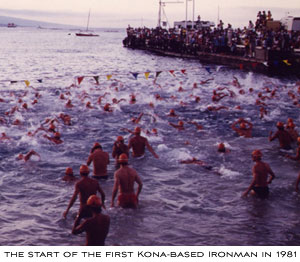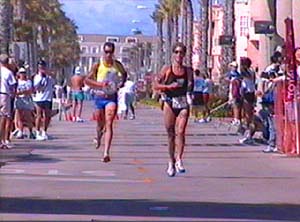Your race budget
As you might imagine, when setting up a budget you have to identify categories into which you stick your proposed expenditures. I've identified categories of my choosing, but you can choose to list them in a different way. Just drop them into a spreadsheet, then add all the costs (including those i've neglected or forgotten to list) and you're rolling.
This is not an exhaustive list of costs, but it'll give you an idea of what you're up against for starters. It's also a nice exercise for those of you who think $80 is too much to charge for a sprint. Yes, it's a lot to spend, but if you think sprints ought to cost $35 or $40, well, have at it cowboy — put on your own race and show us all how it's done 😉
Per Person: You're going to get hit right out the gate with $15 to $20 per person just on T-shirts, swim caps and online registration costs. Don't think it's just the cost of the T-shirts you give to each person you have to incur. It's the cost of the T-shirts you buy, and you always buy more than you need by a considerable margin (because you don't know how many registrants you'll eventually get, and you don't know for sure what the size breakdown will be). So your $5 T-shirt isn't really costing you that price, but probably more like $8.
* T-shirts
* Online registration
* Swim caps
City costs: This is the great unknown. The hard thing about dealing with cities is that these costs are generally very hard to nail down, pre-race. You can scream and whine all you want, but invariably you'll get a bill that is quite a bit higher than anything you expected to get. I'll give you an example from a bike race I put on about a decade ago. I got a public works bill that included an extra $4000. Why? Because they had to fill the potholes on the course. Didn't they have a responsibility to fill them anyway? Sure. But this was a convenient excuse to get someone else to pay for it. After this experience, I now know to slip into a side-letter somewhere a mention that I'll expect not to bear any costs associated with making the course roadworthy.
Obviously, you have to know what your costs are going to be. You've got to try to nail the city down on this. If you've got a big race, and the city wants you, and you get a "grant" against city services, don't fall for this ploy without scrutinizing it. They'll "grant" you $5000 and charge you $20,000, netting you a debit of $15,000. I just don't like this. Better to just settle on a price, and make the city's departments each come up with a cost. You can then work with them to abate or mitigate these costs by using volunteer personnel instead of paid police, etc. When I go to a city to put on a race, almost the first thing I say on the first meeting is, "If you see me as an opportunity to help your cops pad their overtime, just tell me now so I don't waste anyone's time."
* Permits
* Police
* Public works
Site Construction costs: In my nomenclature there is the "site" or the "venue" and by that I mean the swim start, the race finish, the transition area, the expo area, tents, barricades, scaffolding, flags and so forth.
Scaffolding, fencing, barricades, and all that stuff can cost an awful lot of money. "Why do I need scaffolding," you might ask. Where is your announcer going to announce from? And from which vantage point will he be perched so that he can see the race he's calling?
Then there is the sound system he'll need so that he can be heard. Sometimes your announcer will bring his own sound system. Sometimes the scaffolding guy also does the sound system. Either way, you've got to plan for this. You can't assume anything. You must account for everything. Otherwise you'll have scaffolding, an announcer, and no sound system.
Is your race headquarters close to electricity? If not, you need a generator. Maybe more than one. And lots of extension cords. Thick ones, if you need to pull a lot of amps (like for a portable air conditioner or an air compressor). Speaking of the latter, don't overdo it. If you need to fill swim buoys, you don't need a lot of pressure, such as a compressor would give you. You need a lot of cubic feet per minute, such as a hair dryer would give you. You don't need a 200-pound compressor that costs $300. You need a hand-held inflator that looks just like a hair dryer that costs $50. After you've put on a few races you'll discover all the overkill stuff in which you're engaged. You don't necessarily need huge swim buoys, for example. It might be cheaper to borrow small buoys and, if they have a ring attached to the top, anchor an arch of helium-filled balloons to each turn buoy, plus the finish line. It's a nice look, and people provide these arches relatively inexpensively.
What else to you need for your site? Port-a-johns, tables, chairs, pop-up tents, everything that makes a site a site. If you're going to be putting on a race, go to a few races you admire, with a pad and pencil, and list everything you see that you think you might want at your race. List everything. Don't take all that fencing for the transition area, to keep the bikes secure and the spectators out, for granted. Amazing what that fencing costs to rent.
There are plenty of companies under the heading of "party rentals" that rent much of this sort of stuff to you. Write all this stuff down and give your list to a couple of these companies. See how much of it they'll provide, and for how much.
There are almost certainly people who own bike racks in your area and who'll rent both the racks and the assembly and disassembly of them. Almost everybody in the RD biz makes their own racks with the assumption that they will have to rent them out. Don't make your racks until you check out the price of renting someone else's. One word of advice: get more racks than you think you need. One of my pet peeves as a racer is a transition area that doesn't leave enough room to rack all the bikes.
Also, realize that for all these categories of things you need, you need volunteers to erect and put away the hardware. This is your "construction crew." When you rent scaffolding and pop-up tents, you just rent the stuff itself, not the assembly of it.
* Scaffolding
* Fencing
* Sound system
* Port-a-johns
* Bike Racks
Course costs: I differentiate between "site" or "venue" on the one hand, and then the costs of the "course" on the other. The "course" is your triathlon route after it leaves and before it returns to your "site." You'll be unpleasantly surprised when you see how much traffic cones and barricades cost to rent. I always try to get the city to come up with as much of this as possible as a throw-in — they have a bunch of this stuff, as does the county and state highway construction organizations. Ask them all if they'll loan you their cones, barricades, etc. All they can say is no. And don't forget the vehicles you'll need in order to place and retrieve all these items. If you're coning a lane of a bike course, you can't place all your cones with just a pick-up truck.
Yes, I have chairs and pop-up tents listed below. Didn't I cover these items above? Yes, for the "site," but not for the course. Remember your aid stations.
* Cones
* Barricades
* Signs
* Swim buoys
* Aid stations
o Cups
o Tables
o Chairs
o Pop-up tents
o Fluid replacement
o Coolers/trash cans
o Ice
o Aid station food
* Vehicles
Race specific costs: Perhaps you don't need everything listed below. But you'll need a lot of it. Realize that on-site registration and timing is not the same as online registration. You need to hand that online data over to a company that will time your race, and they'll also be handling your late registration (with the help of the volunteers you provide).
You might find the idea of "volunteer costs" oxymoronic. How can a volunteer cost? While it's true that the volunteer doesn't charge, the organization to which he's attached does charge. Often it's your charity and, really, you need to be strategic when picking your charity. If it can't deliver a lot of volunteers, then you might think about another charity. The point is, nobody works for free. Even volunteers.
* Timing
* On-site registration
* Post-race results mailing
* Announcing
* Supplemental Insurance
* Volunteer costs?
* Volunteer T-shirts
* Post-race food
* Race awards
Advertising costs: I'm not just speaking of the ads that are geared toward getting the athletes to register for your race, although that's part of it. Do you have sponsors? Do they have banners? Are they expecting you to advertise their name for them at your race? Are they named on your finish banner? If so, then you've got to make a finish banner. Whatever signage you promise, you must execute. I can't remember a race in which I didn't incur costs of this sort.
* Banners
* Start/finish
* Posters
* Ads
* Website
* Prize money/pro appearance?
The other stuff: Then there's the stuff neither you nor I could even contemplate. Once I put on a race at which a bunch of cars that were on the race course ended up getting towed. Yes, we mailed notices saying when the course must be free of cars, and we put up signs, and all that. But these were people who came in the night before the race — people who rented vacation houses, or who only visited their vacation homes occasionally. They didn't feel like they ought to have been towed. The city certainly wasn't going to come up with the cash to pay the towing companies. So we did. The next year we rented the use of a tow truck for the morning and, with the help of the city, designated an empty lot that would be only a couple of blocks from anyone's home whose car was towed. Okay, it cost us a few hundred bucks for the rental of the tow truck and driver, but it was thousands cheaper than what we had to pay the year before.
You never know what's going to happen. Best to budget a slush fund for Acts of God and man.
I haven't yet written about the revenue side of your budget. Frankly, I don't feel that need for that. It's easy for prospective RDs to figure out where they think the money is coming from — race registration, sponsors, expo booth sales — but it's a lot harder to properly account for all the expenses. My best advice to you on the revenue side it, count on at least one-third fewer entries than your most conservative guess would total. Probably half is a better number. In other words, if you're reasonably sure you'll get 700 in your first year, but you'll certainly at least get 500, budget for 250 or 300.




Start the discussion at slowtwitch.northend.network